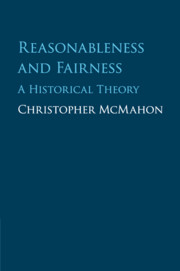Book contents
6 - Naturalism and Moral History
from Part II - The History of Reciprocal Concern
Published online by Cambridge University Press: 24 November 2016
Summary
My constructivist theory of judgments of reasonableness and fairness is built on the foundation of a realist view of the normativity of proper functioning. Further, I take proper functioning to be a nonnatural normative property. I have said that I do not believe that naturalistic views, in their current form, can adequately account for the fact that we are normative animals who live in a world of “oughts.”
In saying that we live in a world of “oughts,” I am indicating my acceptance of the reality of normative guidance, in the sense explained in Chapter 4. The normative experiences we have are not simply epiphenomena. They point us in certain directions – or better, through them we point ourselves in certain directions – and we are capable of following this guidance. There is an element of mystery about this, but I do not regard it as a supernatural phenomenon. Rather I take it that normative guidance, guidance by thought that has a conscious normative dimension, is something that becomes possible at a certain level of biological complexity.
I have no story to tell about how we emerged as normative animals. Rather I start from where we are now. Modern life has a complex, highly structured normative dimension. The “oughts” are innumerable, extraordinarily subtle, and intricately interrelated. I take this complex normative structure to be a historical product created over time by the exercise of human cognitive, motivational, and linguistic capacities in ways that manifested proper functioning in a changing natural and social environment. I arrive at the idea that the normative dimension of human life emerged at some point in the natural history of the species by working backward through this historical process to a hypothetical point of transition at which natural phenomena first took on a nonnatural aspect. A natural process of some kind brought into existence the supervenience basis of normatively charged mental life. Life on earth thus crossed a threshold at which mental processes became capable of possessing the nonnatural normative attribute that I have labeled “proper functioning,” and the lives of human beings became susceptible to normative guidance.
As I also mentioned in Chapter 4, I am prepared to accept that at some point in the future, philosophical naturalism may be able to provide an account of the normative that fully accommodates the reality of normative guidance and the complex normative structures associated with it.
- Type
- Chapter
- Information
- Reasonableness and FairnessA Historical Theory, pp. 186 - 204Publisher: Cambridge University PressPrint publication year: 2016



